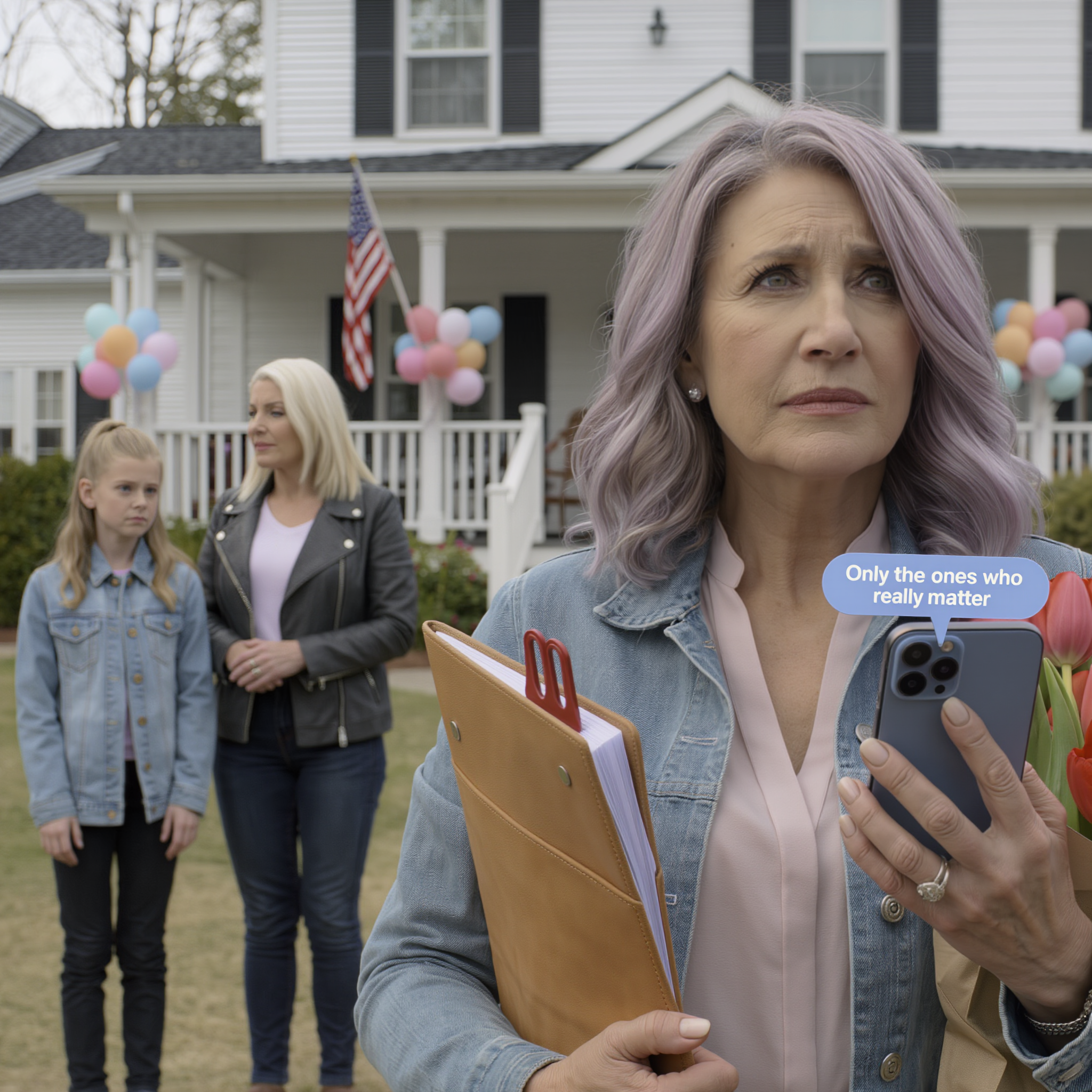
It was a Friday morning, just two days before Mother’s Day, and the quiet hum of rain outside matched the heaviness inside me. I sat at my kitchen table with a mug of coffee and a small vase of tulips, thinking about how the weekend had once been filled with laughter, cards, and Camille’s bright voice calling me Mom. Those days had faded, but I still held on to the hope that this year might bring a small reminder of what we once had.
So I typed a simple message: “Hi, Camille. Just checking in. Are we doing anything special on Sunday? Should I bring dessert?” I pictured her suggesting brunch or maybe a drive to the coast.
The reply came almost instantly, but instead of warmth, it carried a blow that knocked the breath from me: “Oops, we forgot to tell you. I just invited my MIL. Only the ones who really matter.”
I read it three times—only the ones who really matter. The words cut deeper each time. There was no wink, no softening, no joke to take away the sting. My hands trembled as I set the mug down carefully, afraid I might shatter it.
I had always known Camille was close with her mother‑in‑law. But this wasn’t about closeness. This was about exclusion.
My own daughter had told me, in the clearest terms, that I was no longer part of her circle.
Mother’s Day dawned gray and cool. I woke to silence—no calls, no knock at the door, no sound of pancakes sizzling like the mornings when Camille was small. I brewed coffee and sat at the same table where, years ago, she had brought me burnt toast on a tray, her crayon cards bursting with crooked hearts. Now the only sound was the tick of the kitchen clock. No message, no visit, nothing.
I tried not to check my phone, but its blank screen confirmed the truth. Camille had grown more distant for years, slipping away with excuses, distractions, and sly comments—my clothes were old‑fashioned, my cooking outdated, my memory not as sharp as it once was. At first, I brushed them off as harmless remarks, but over time each one chipped away at me until I realized they weren’t jokes at all; they were part of a slow dismissal.
Christmas had been spent without me. Thanksgiving had ended with hushed whispers I wasn’t meant to hear. Mother’s Day was not a mistake. It was the final proof that I had been deliberately pushed aside.
By Monday morning, the sting of rejection had settled into something steadier: resolve.
I went to my study and pulled out the thick leather binder I had kept for decades. Inside were the documents that told the story of my life’s sacrifices: the deed to this house left to me by my parents, paid in full and in my name alone; the bank statements showing years of careful saving; the investments I had nurtured since my thirties; the tuition payments I had covered so Camille graduated debt‑free; the checks I had written for her wedding, her first house, her newer car. Even the roof over her head had been secured because I had reached into my accounts to make it possible.
It struck me how invisible those sacrifices must have seemed to her, as if comfort simply appeared without years of planning and labor. Yet there it was in black and white. The life she enjoyed had been built from my choices—my money, my name. The truth began to settle uncomfortably in my chest.
Perhaps this wasn’t just emotional distance. Perhaps Camille was positioning herself for more—something beyond holidays and invitations.
I called my financial adviser, Harold, to request a full review. His pause on the other end told me everything before his words even landed. Three weeks earlier, Camille had contacted his office asking to add her name—and her husband’s name—to certain accounts. She had claimed I was struggling with memory concerns, that I needed extra oversight.
My heart pounded at the betrayal. She had tried to brand me as forgetful, incompetent, even before she had excluded me on Mother’s Day. Thankfully, Harold had refused. But the fact she had tried at all turned my grief into a sharper determination.
That night, I moved swiftly. I closed joint accounts, changed passwords, updated security questions, and revoked every linked device I did not recognize. I canceled credit cards they had used for convenience, set alerts for any attempts to access my funds, and rerouted all bills through accounts only in my name. The house grew dark as I worked, but my resolve shone brighter than it had in years.
Camille thought she was maneuvering me into weakness. All she had done was remind me exactly how strong I still was.
For three days, there was silence. To anyone else, it might have looked like distance. To me, it felt like the charged pause before a storm breaks.
I used that time well, meeting with my attorney to revise my will. Camille’s inheritance would no longer be guaranteed; it would come only with clear conditions, written in legal ink. At the bank, I confirmed there were no shared accounts. At the insurance office, I removed her name as contingent contact. Curiosity drove me further, so I called the mortgage company for her house. Their response chilled me: Camille and her husband were already more than thirty days past due. Not only entitled, but dependent—counting on me to cover what they could not manage.
The next day, as I trimmed lavender in the garden, my phone buzzed with Camille’s name. For a moment, I considered silence, but curiosity won. Her voice was sharp, clipped.
“Mom, our card just got declined. We’re at lunch. Something’s wrong with the bank.”
“Nothing’s wrong with the bank,” I answered calmly. “Every account you’ve used is closed.”
I imagined her cheeks burning as she sat across from her mother‑in‑law, realizing the gold card would no longer cover her meal.
“Why would you do that?” she demanded.
“Respect,” I replied evenly. “That’s the price of access. And right now, you can’t afford either.”
Her gasp echoed in my ear. And for once, I didn’t flinch. The silence after Camille’s sharp inhale told me more than her words could. Somewhere in that elegant restaurant, she was scrambling for composure—her husband muttering in the background, her mother‑in‑law watching with either concern or smug satisfaction.
When she finally spoke, her voice quivered with restrained fury. “This is petty, Mom.”
“No, Camille,” I kept my tone level. “This is overdue.”
She sputtered something about discussing it later, then abruptly hung up.
I slipped my phone back into my pocket and returned to my lavender, the scent rising from the trimmed stalks calming me. For the first time in years, I felt steady, as though I had reclaimed ground I had long ago surrendered.
It didn’t take long for the storm to arrive. That evening, I heard the slam of car doors outside and the crunch of hurried footsteps up my walk. My front door opened without knocking, and in swept Camille, her husband tight‑lipped behind her, and Marlene—the mother‑in‑law who had so often been the centerpiece of my daughter’s admiration.
Camille’s cheeks were flushed, her eyes blazing. “We need to talk,” she declared, her voice cutting the air. “What you’ve done is beyond overreacting.”
I stayed by the counter, folding my arms. “What I’ve done is protect what’s mine.”
Her husband stepped forward, his calm but condescending tone filling the kitchen. “Lorraine, you’re making this a bigger deal than it needs to be. You’re being controlling. We just want to help manage things so you’re not overwhelmed.”
His words, so carefully crafted to sound reasonable, only deepened the insult.
I reached for the folder I had prepared and slid it across the table toward them. “Seventy percent of the assets you’ve enjoyed all these years are in my name alone,” I said. “The house we’re standing in—mine, paid off long before you were married. That car you’re driving? Purchased from my account without my informed consent. You’ve mistaken generosity for weakness.”
Camille’s eyes narrowed, hurt and rage warring in her expression. “I knew you’d throw that in my face. You’ve been suffocating me my entire life, always needing to be part of every decision. I’m married now. Mom, you can’t keep treating me like a child.”
I took a slow breath, keeping my voice even. “You’re right about one thing. I did hold on too tightly at times. I wanted to be part of your life in ways I probably should have stepped back from. But there’s a difference between setting boundaries and cutting someone out with lies and manipulation. You didn’t ask for space—you took it. And you did it while trying to help yourself to my money.”
Marlene shifted uncomfortably, glancing down, but said nothing.
“So what now?” Camille crossed her arms. “You cut us off completely?”
I met her gaze and felt no hesitation. “You wanted independence. You’ll have it—financial, emotional, all of it. But independence means you live within your means, on your terms, not mine.”
The air thickened between us, heavy with words left unsaid. For the first time, I wasn’t afraid of that silence. I let it settle as I gathered my folder back toward me, closed it, and rested my hands firmly on top.
“Here’s where we stand,” I said quietly but firmly. “You have thirty days to repay the money for the car, or we put a repayment plan in writing with interest. From this moment forward, there will be no joint accounts, no shared credit cards, and no financial gifts. If you ever need help again, it will only come after I see consistent respect. Not a day before.”
Camille’s mouth opened as if to argue, but I lifted my hand, stopping her. “This isn’t a discussion. These are the terms. Take them or leave them.”
Her husband’s jaw tightened, his composure cracking just slightly. Marlene’s eyes flicked between us, caught in the awkward balance of loyalty and discomfort.
“You’re unbelievable,” Camille said, her cheeks burning red. “After everything I’ve done for you.”
A sharp laugh escaped me before I could stop it. “After everything you’ve done for me, Camille? Every step of your adult life has been made possible by what I’ve given you. I’m only asking for respect and honesty. If that’s too much, then maybe we both need this distance.”
Her lips pressed into a thin line. “Fine. We’ll figure it out without you.”
She turned abruptly, storming toward the door, her husband and Marlene trailing behind her. The slam of the front door echoed through the house like a final gavel strike.
I stood in the stillness of the kitchen, letting the quiet sink in. For once, instead of the familiar ache after our fights, I felt something new—lightness, relief.
In the days that followed, I carried that lightness with me. I spent mornings in the garden, evenings with books I had set aside long ago, and afternoons writing letters to old friends I hadn’t spoken to in years. Slowly, I began reclaiming parts of myself I had lost in the endless giving, the constant availability—the quiet erasure of my own needs in the name of family.
For decades, I had lived as though my worth was tied only to what I provided for Camille. But as I sat in my kitchen in the soft glow of late afternoon, I realized I was finally learning to matter to myself.
Weeks passed, and the tension that had once knotted my chest slowly began to unwind. I kept busy not with obligations to Camille, but with things I had long denied myself. I replanted the flower beds in colors I loved, not what anyone else suggested. I signed up for an art class at the community center and found myself laughing with strangers as paint smeared under my nails. For the first time in years, my calendar filled with activities chosen solely by me. The freedom was startling at first—almost guilty, as though I were sneaking joy—but soon it became natural.
One morning, as I sat outside with my coffee, I thought back to the binder of documents that had once felt like a burden. For decades, I had seen it only as responsibility—proof of my duty to provide. Now I realized it was also proof of something else: my own resilience. I had built security through patience, sacrifice, and discipline. Camille might have tried to diminish me with whispers about memory loss or to erase me with exclusion, but nothing could erase the truth in those records. I had been the foundation of her life. That power was still mine, whether she acknowledged it or not.
It was during one of these quiet mornings that the phone rang again. Camille’s name lit the screen for a heartbeat. I considered ignoring it, but curiosity, as always, tugged me. I answered. Her tone was softer this time, edged with a brittleness that suggested desperation more than anger.
“Mom,” she began. “We need to talk. Things have been difficult. We’ve been under a lot of pressure financially. I shouldn’t have said some of the things I did.”
I let her words hang there, not rushing to fill the silence. In the past, I would have jumped in to smooth things over, to reassure her. But not now.
After a pause, I said, “Camille, I know you’re under pressure. I also know you tried to take control of my accounts by claiming I was losing my memory. That’s not just words spoken in frustration. That was calculated.”
Her breath hitched. “It wasn’t like that. We thought—” she faltered.
I cut in gently but firmly. “No, Camille. You didn’t think about what it would do to me. You thought about what it might get for you. That’s the difference.”
There was another long silence, filled with everything she couldn’t admit. Finally, she muttered, “So what now? Are we just done?”
I looked out across the garden, the lavender swaying gently in the breeze. “That’s up to you. You have my terms: respect, honesty, and accountability. Without those, yes, we’re done. With them, maybe there’s a path forward—but it will take time, and you’ll have to prove it, not just say it.”
She didn’t respond. The line went quiet, and then the call ended.
I stared at the phone in my hand for a moment, then set it aside. I didn’t feel the familiar ache, the desperate urge to chase reconciliation. Instead, I felt calm. Whatever happened next would be her choice, not mine.
Later that week, I sat at a weathered table outside a café in Cannon Beach, meeting two women I hadn’t seen in years—old friends long neglected because I had always been too busy being available for Camille. The sea breeze carried the mingled scent of salt and coffee as we caught up, laughter spilling across the table. We talked about nothing of consequence—tides, books, the best pie in town—but the ease of it felt like a gift. For once, I wasn’t holding my breath, waiting to say the right thing to keep the peace. I was simply living, and it was enough.
In the evenings, I began planning a trip I had dreamed of for years but never taken: three weeks in Italy—no compromises, no negotiations, no waiting for anyone’s schedule but mine. When I clicked confirm on the ticket, I felt a surge of something almost childlike: pure anticipation.
My life no longer felt like a series of closed doors. It felt like a book with blank pages waiting for me to decide what came next. I still thought of Camille—of course. A mother cannot erase decades of love as easily as closing a bank account. But love without respect is a chain, not a bond. For years, I had confused the two, allowing myself to be diminished piece by piece. Now I understood the difference. I could love my daughter, but I no longer needed to let her define my worth.
One morning, as I walked along the shoreline with the sun breaking through the clouds, I felt that lightness again—the one that had begun on the day I said no. Camille had tried to make me feel like nothing more than an extra in my own life. But in pushing me away, she had given me a gift. She had forced me to see that I mattered, not for what I gave, but for who I was.
The weeks turned into months, and with each passing day, I felt the distance between Camille and me becoming less of a wound and more of a boundary—one that no longer left me gasping for air, but instead gave me room to breathe.
For so long, I had allowed my life to orbit around her—adjusting my plans, silencing my needs, pouring resources into her comfort. Now, as I planted flowers in the yard or painted clumsy strokes in art class, I realized how much of myself I had overlooked. Each choice I made for me, however small, felt like stitching back a piece of fabric I hadn’t realized had been fraying.
Occasionally, Camille’s name would light up my phone, but the calls were brief. Sometimes she would test the edges of my resolve, asking if I might reconsider sharing accounts again, or if I would at least cover one late payment just this once. Each time I stayed calm. “Independence, Camille,” I reminded her gently. “You asked for it—now you have it.” The words always landed like stones, followed by silence, and then the call would end.
And yet, though she resisted, I sensed she was beginning to understand—slowly—that the days of easy handouts were gone.
What surprised me most was how little I missed the old pattern of rushing in to fix things. For years, I had mistaken rescuing Camille for connection, as if writing checks or co‑signing loans was proof of closeness. In truth, it had been a leash—one she resented as much as she relied on. Without it, we were both forced to stand on our own ground. For me, that ground was firmer than I had believed. For her, it was shakier, but perhaps necessary.
One crisp morning in late autumn, I sat on the porch wrapped in a blanket, sipping tea as the sun rose over the garden. The air smelled of damp leaves and wood smoke, and I found myself thinking about the long arc of motherhood. We begin with our arms full, holding our children against us, guiding every step. Then, slowly, we’re meant to let go, to trust them to walk alone.
Somewhere along the way, I had confused letting go with disappearing—as though stepping back meant erasing myself. But it didn’t. It meant allowing Camille to face the weight of her own choices, even if those choices hurt me.
I thought about the text that had started it all—only the ones who really matter—and how those words had once burned like fire in my chest. Now I saw them differently. They had been cruel, yes, but also clarifying. They forced me to see that mattering was not something to be granted by others, not even by my daughter. Mattering had to come from within. And at sixty‑eight years old, I had finally decided that I mattered to me.
When I boarded the plane to Italy, suitcase rolling behind me, I carried no guilt. For three weeks, I wandered cobblestone streets, marveled at frescoes older than memory, ate gelato by the sea. I laughed with strangers, got lost in winding alleys, and stood on bridges as church bells told the hour. Not once did I check my phone, waiting for Camille’s approval or invitation. I lived each day fully, and it felt like drinking water after years of thirst.
Returning home, I felt a different kind of strength. My house—once a reminder of lonely meals and unreturned calls—now felt like a sanctuary. The binder of documents was still there in my study, but instead of symbolizing duty or fear, it now felt like a safety net of my own making. Not for Camille, not for her husband, not even for some future inheritance, but for me—for the life I was still living.
One evening, as the sun dipped low and painted the sky in shades of rose and gold, I received a text from Camille. It was short, almost hesitant: Thinking of you. Hope you’re doing well.
My heart tightened, but not with desperation.
I smiled, set the phone aside, and continued watering the flowers. Perhaps one day we would find a path back to each other. Perhaps not. But I no longer needed her validation to feel whole.
Life had taught me a lesson I wished I had learned sooner: love without respect erodes you, and giving without boundaries empties you. Family should be built on mutual care, not silent expectation or manipulation. And sometimes the bravest thing a mother can do is step back and say enough.
I began to notice the little ways my life was filling back in. The pantry had more than emergency soup; I bought Meyer lemons because I liked their scent when the knife first breaks the skin. I moved the chair by the window two feet to the left so the afternoon light hit my book instead of my eyes. I learned the names of the two crows that visited the birdbath—at least I pretended I did. It felt like reclaiming a language I used to speak fluently: my own.
On a Tuesday that smelled like rain and cut grass, Harold called to follow up. He asked for permission to put a simple safeguard on file—no changes without my written consent, a code phrase only we knew. We chose something private from a childhood memory and both smiled at how immediately it anchored me. He said, “You sound lighter.” I said, “I am.”
When I met my attorney again—her name was Priya, brisk and kind in equal measure—she asked who I wanted seated at future tables if I wasn’t able to speak for myself. I surprised both of us by not saying Camille. I named two friends who actually showed up: Marla from the library board, whose casseroles could silence a room, and Sheila, who once drove me to the urgent care at midnight because my elbow wouldn’t bend. Love is a verb. We wrote that into the instructions without putting those exact words on paper. Priya slid the pen toward me. “You’re allowed to choose the people who act like family,” she said. “Even when family forgets how.”
The next weeks unspooled cleanly. I switched my phone’s wallpaper from a photo of Camille’s wedding to a picture I took myself on the coast, the sky the color of pewter and the foam on the water like lace. I hung wind chimes in the maple tree and listened to them argue pleasantly with the wind. The mail brought a letter addressed to “Occupant” about a community garden plot becoming available. I circled the phone number and left it on the fridge, half‑decided, liking the way possibility looks on a piece of paper.
Every so often, a message would arrive from Camille like a stone skipping: “Did you change the cable login?” “Do you still have my stand mixer?” “Can you send the recipe for the lemon bars?” I answered what I wanted and left the rest untouched. I did send the recipe. I wrote, “Zest the lemons right over the bowl so the oils fall in. That’s the secret.” It felt like telling the truth about more than dessert.
The first hard frost of the year crisped the lavender to a beautiful gray. On that morning, the doorbell rang just after nine. I wiped my hands on a towel and opened the door to find Marlene on my porch, alone, her lipstick a shade too bright for early light. For a second I saw the younger woman she must have been—sharp, certain, able to bend a table’s conversation with a glance. She held a pie, of all ridiculous, fragile offerings.
“I came to talk,” she said. “Without them.”
I stepped back and let her in. We stood in the kitchen like two diplomats without countries. She set the pie down and folded her hands. “I didn’t raise Camille,” she began. “But I did raise a son who married her. And right now my Sunday dinners are a war zone. I can’t fix what isn’t mine, but I can tell you I see you. And I’m sorry for my part in making you small in rooms where you should have been large.”
It wasn’t what I expected. I poured coffee into heavy mugs and we sat. She told me what I already suspected: that the mortgage was slipping, the car payment was late, the stories they told other people about the privileges of marriage were as curated as an advertisement. She told me, in a smaller voice, that her own mother had once iced her out for a year and she hadn’t forgiven herself for wasting that time on pride. “I don’t want you two to waste your lives,” she said. “But I also don’t want you to be used.”
“Those can both be true,” I said. “And I’m not interested in being useful if it costs me myself.”
She laughed, short and appreciative. “If they ask me, I’ll say I told you to be mean. Let them think I’m the dragon.” She glanced around my kitchen—the ordinary mercy of sugar in a jar, a lemon in a bowl, a grocery list clipped to a magnet. “This is a good house,” she said. “It feels like it was paid for with careful hands.”
“It was,” I said. “And I’ll keep it that way.”
When she left, she hugged me tightly and fast, as if contact itself had to sneak through before permission could catch up. I stood in the doorway after she drove off and felt something ease—some knot I didn’t realize I’d been feeding.
The Italy trip came like a bell rung across distance. In Florence, I stood in front of a fresco of a mother and child surrounded by saints whose faces had been repaired again and again over centuries. A docent with soft shoes and a softer voice said, “We repaint what time takes. We do not pretend it was never broken.” I wrote that in my notebook. Later, in Venice, a woman my age named Elisabetta sold me a scarf and told me in cheerful English that adult children are like tides: sometimes they come close enough to soak your ankles; sometimes the water line withdraws so far you think the sea has ended. “But the sea,” she whispered, “does not end.”
On the Amalfi steps, I ate a lemon like an apple and felt the bitter oils sting my tongue and thought: I am here, and the taste is mine. The trip stitched itself into me like a second lining.
Back home, winter settled properly. I started the community plot in February, ignoring the calendar’s suggestion that it was too early. I turned the soil and tucked in garlic and sweet peas and thought about time as something you enter instead of something you chase. Harold called once more and told me, almost embarrassed, that Camille had phoned again, pressing harder, asking if there were forms that could make things easier “for the family.” He said he told her what he’d tell anyone: that simplicity isn’t the same as safety, and nothing would change without my say‑so.
“What did she say?” I asked.
“Nothing I can print,” he answered, and we both laughed.
In March, the knock at the door I had been expecting—not dreading, not hoping for, simply expecting—finally came. Camille stood on my porch alone, shoulders hunched in a coat too thin for the wind. No eyeliner. No performance.
“Can I come in?” she asked.
“Yes,” I said, because boundaries are about the terms, not the refusal to open a door.
She sat at the table and didn’t touch the mug I set in front of her. For a long minute we just listened to the heater click and the clock make its uncomplicated progress.
“Why would you do this, Mom?” she said finally, and the old script fluttered between us like a handbill for a show no one wanted to see.
I let the question land without scrambling to make it easy. I took my time. I watched a sparrow hop madly along the fence and thought of all the mornings I had filled in with other people’s emergencies.
“Because,” I said, “you told me who mattered. I believed you. And I put myself on that list.”
She blinked, not expecting the mirror. “I didn’t mean—”
“You did,” I said, gently. “Maybe not in the way you’d write on a Hallmark card, but you meant the life you were living. I can love you without financing the story you prefer. I can love you without accepting a lie about my mind. I can love you and still have a lock on my own door.”
She swallowed. “We’re in trouble,” she said, and the words sounded like a confession she’d rehearsed in the car. “The bank called again. The late fees are piling up and we can’t—” She looked up. “Could you help this once? We’ll pay you back.”
A year ago I would have been up from the chair with my checkbook already warm in my hand, throwing money at a fire and calling it love. Now I took a breath that belonged to me and I said, “Here’s what I can offer.”
She lifted her chin, braced.
“I’ll match whatever you earn above your normal paycheck for the next six months,” I said. “If you sell a car, take an extra shift, pick up a contract, I’ll match it dollar for dollar and the money goes straight to the mortgage, not to a card, not to a dinner, not to anything that isn’t a roof. You’ll send me the statement; I’ll send the match. We’ll review together, every month, with Harold on the call. If you miss a month, the matching stops. If you lie, it stops forever.”
She stared at me, as if the shape of responsibility were a language she could understand but had never been asked to speak. “That’s…strict,” she said.
“It’s respectful,” I said. “To you. To me. To the future.”
She rubbed at her thumb with her forefinger, a nervous habit that sped up when she was twelve and trying to talk her way out of a tardy slip. “What if we can’t do it?”
“Then you’ll do something else hard,” I said. “Sell the extra television. Take in a roommate. Trade the car. Ask your husband to deliver groceries at night. People live inside their means every day. It isn’t personal—it’s math.”
We sat in the quiet. The house held us without effort. I thought of all the times I had filled the silence with apologies, a parade of softening words. Now I let the silence do its proper work. It separated what she wanted from what was possible.
“Okay,” she said finally. And because she is my daughter and life is not a straight road, her voice broke. “Okay.”
We started small. She sent me screenshots of deposits; I matched them and sent the checks straight to the mortgage company with a memo line that read “Principal Only.” The first months were mostly her fits and starts and my quiet consistency. Once, she texted a picture of a dress with a caption that read, “I’ve wanted this forever.” I typed: “Wanting isn’t a plan,” then deleted it and wrote, “You’ll like your future more than this dress.” She didn’t reply, which was its own kind of reply.
I did not go to their house. I did not sit at their table on Sundays and pretend my chair had always been there. I worked my plot at the garden. The sweet peas made ladders of themselves. The garlic pushed up with the stubbornness I recognized in my own bones. I joined a Tuesday night watercolor group where everyone painted bowls of fruit and someone always brought brownies.
In May, almost a year after the original text that started this new life, I made a plan for Mother’s Day without waiting for a plan to include me. I hauled a long folding table out to the front lawn and covered it with a cloth I’d been saving for a better time. I set places with dishes that didn’t match in a way that did. I baked a chicken and a pan of lemon bars—the kind with the oil‑shining zest stirred right over the bowl. I made a pot of tea and a pitcher of iced mint water. Then I walked up and down the street and invited every neighbor who had ever rescued a package or waved from a mower or asked about my roses. I told them there was no RSVP, only a chair if they wanted one.
When people began to arrive, awkward at first and then easy, a few of them brought photos of mothers. One woman brought her mother. Two men brought their little girl who wore a crown made of paper. We passed plates; we refilled cups; the wind chimes argued with the wind and nobody minded. An elderly man from four houses down told a story about a fishing trip in 1953 that sounded suspicious even as he swore every fish was true. We applauded anyway. When someone asked what we were celebrating, I said, “Only the ones who really matter,” and didn’t explain. Heads nodded. Sometimes explanation is just an apology in fancier clothes.
Midway through the afternoon, a car slowed in front of the house. Camille was in the passenger seat, her husband driving. They stopped, watching us from the curb like people who have been told a movie is much better than they expected. She didn’t get out. I didn’t wave her over. Some distances need to be crossed on foot.
At dusk, after the chairs were folded and the last dish was nested into the right cupboard, my phone buzzed. A text from Camille: “I saw your table.” Another: “We made our payment this month without your match.” A third: “I’m… proud. Of us.” I smiled and typed what I meant. “Me too.” Then, after a minute: “I have lemon bars left.” I set a plate on the porch with a napkin and went to bed. In the morning, the plate was empty and the napkin was folded under the dish, just how I taught her when she was small.
Summer came. The garden leaned into itself the way a person does when they’ve remembered who they are. The wind chimes argued less and sang more. One evening, as the light slid gold across the kitchen floor, the phone rang again. Camille, not brittle. Not demanding. “We’re hosting Sunday,” she said. “It’s a simple thing. Soup and bread. Would you like to come?” There it was—the question, not the assumption. The place held open, not the seat dragged from under me.
“Thank you,” I said. “I’ll think about it.” And I did. I thought until the simple yes in me caught up with the careful woman I had become. I texted back: “I’ll bring a salad.”
At her house, the table was smaller than her voice usually liked it to be. She’d cleared space with real hands, not the imaginary ones she used to live by. We ate soup that tasted like trying and bread that tasted like planning ahead. When she reached for the pitcher, our fingers touched. She looked up and said, quietly, “I’m not ready to say I’m sorry for everything. But I’m sorry for enough of it to start.”
“That’s all beginnings are,” I said. “Enough.”
After we ate, she walked me to the door. “One more thing,” she said, staring straight at my face like people do when the truth is finally their size. “When I asked you ‘Why would you do this,’ I wanted you to justify hurting me. I kept waiting for you to admit you were punishing me. I realize now you were protecting yourself.”
“I was,” I said. “And I am. That won’t change.”
She nodded. “I understand.”
On the porch, before I left, she looked back into the house and then at me. “Next Mother’s Day,” she said, voice shy in a way I hadn’t heard since she was eight and worried about a school play, “I’d like you at our table. If it’s still a good table by then.”
I considered the question from all its angles and gave her the only answer I have learned to trust. “Ask me again when we’re close to it,” I said. “And remember—respect is still the price of access.”
She smiled, a small real thing. “I can afford that,” she said.
That night, I wrote myself a note and slid it into the binder, not as a legal document but as a compass: I matter. I am allowed to choose the people who act like family. My love has a spine.
The next morning smelled like coffee and wet grass again. I sat at the table with the tulips and the light steady on the page, and without thinking I wrote the words that began this entire chapter of my life: only the ones who really matter. This time the sentence was not a weapon. It was a map.
If this story touched you, don’t forget to like, share, and subscribe for more stories like this. And tell me in the comments: have you ever had to draw a hard boundary with someone you love? I’d love to hear your thoughts.





